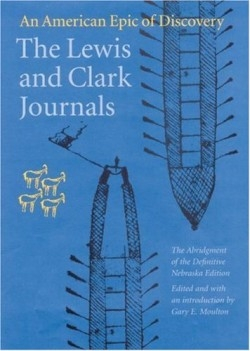It looks like you've stumbled upon a page meant to be read by our code instead of viewed directly. You're probably looking for this page.
The Lewis and Clark Journals
An American Epic of Discovery
“Ocian in view! O! the joy.” Such was the exclamation raised by Captain William Clark as he, Captain Meriwether Lewis, and their party caught sight of what they believed was the Pacific Ocean on November 7, 1805 after traversing nearly sixteen months across the Great Plains and the rugged Rocky Mountains.
The men, however, were mistaken—they had actually sighted the Columbia River estuary, not the long-awaited end of their voyage west. It would be another six days of confinement in rainy, disagreeable weather before they made their way to the ocean.
This is but a single moment in the true adventurous tale of the famous Lewis and Clark expedition, told in the words of the men who experienced it. The editor, a professor of American History at the University of Nebraska, has spent more than twenty years studying the expedition. Twelve of his previous books on the subject have been abridged into this volume.
Handpicked by President Jefferson to find a water passage across the lands recently acquired through the Louisiana Purchase, Lewis and Clark and several of their company kept journals of their 1804-1806 trip, detailing the Indians they met, their customs, villages, and the land and the creatures inhabiting it.
Noted Clark about the Teton Indians: “When any of thos people Die they pierce ther flesh with arrows above & below ther elbows as a testimony of ther grief.” In early November, 1804, the group took on Frenchman Toussaint Charbonneau as an interpreter. According to Clark, “He informed us his 2 Squars were Snake Indians, we engau him to go on with us and take one of his wives to interpret.”
That wife was Sacagawea, who gave birth early the following year to a son.
Food was scarce during the two winters the party traveled. While wintering at the mouth of the Columbia River in January, 1806, Lewis remarks that the party has been obliged to subsist on dogs and “have now become extreemly fond of their flesh.”
In a forty-four-page introduction, Moulton outlines and highlights expedition events and adds extensive background to the journal entries, mostly written by Clark and Lewis, with observations by Sergeants Ordway and Gass and private Whitehouse.
While the book may be slow going due to the grammatical accuracy maintained from the original journals, it’s an eye-opening account of a time when a major portion of the country was wild and unknown.
Disclosure: This article is not an endorsement, but a review. The publisher of this book provided free copies of the book to have their book reviewed by a professional reviewer. No fee was paid by the publisher for this review. Foreword Reviews only recommends books that we love. Foreword Magazine, Inc. is disclosing this in accordance with the Federal Trade Commission’s 16 CFR, Part 255.
